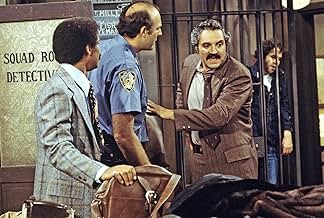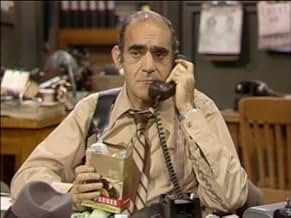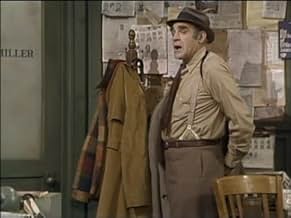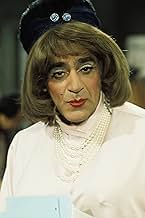The Captain of the NYPD 12th Precinct and his staff handle the various local troubles and characters that come into the squad room.The Captain of the NYPD 12th Precinct and his staff handle the various local troubles and characters that come into the squad room.The Captain of the NYPD 12th Precinct and his staff handle the various local troubles and characters that come into the squad room.
- Won 3 Primetime Emmys
- 9 wins & 43 nominations total
Browse episodes
Featured reviews
"Barney Miller" showed the gritty realism of police work in New York City in the 1970s, albeit with humor. Skits about the impending bankruptcy of the city, some of the futile criminal behavior (man stuck inside ductwork trying to burglarize a store), the mundane day in, day out existence of police officers with the occasional heart-pounding, adrenalin rush of excitement, and of course, what we in the profession called "the hairbags" - the old cops, forever full of stories, content to live in the past as Inspector Lugar exemplifies. To those who say "Barney Miller" is dated, I say the show is a timeless slice of life, and can be set in almost any locale and time period. The cast could not have been picked with any more brilliance, and the production was seamless. I say "Barney Miller" is a classic for the generations.
I am a fairly young person and I was very pleased to find such a wonderful show on DVD. The title of the show through me off, but after reading a bit about the show I was intrigued and bought it.
At first the show mainly focuses on the situations and what the cops are doing, but after a while the show starts to focus only on the squad-room where the detectives convene.
Barney Miller is always getting into other peoples business. When a criminal comes in he Interrogates them and tries to get the whole story out of them and also tries to put his own opinion or label on it.
Most of the stories are very light-hearted, but some do hit close to home. The show is funny, comical, and well played, but some episodes do have a serious vibe at the end of them.
By season three the cast is permanent and the show gets its real humor on. Each detective has an impressive amount of character depth. It was interesting to learn about each of them as I watched all of the episodes. By the end, I felt as if I knew each of them personally.
The only parts of the show I didn't like was Lt. Scanlon. His character was played so well, I truly didn't like him. Inspector Luger was played by a veteran actor, but his character seemed a little dim-witted. By the end of the series, the only set you would see is the squad room. After having visited a couple different stage sets (for example: Barnies apartment, Fish's apartment and the hide-out apartment) it seemed very confining to only use the squad room in the later seasons.
The exits of Fish and Yemada were torture on the show. Fish was great when it came to quick and ironic humor while nick tried to do the same, but his character was never truly replaced.
Overall, I love this show and I continue to watch it often. The humor, the stories, the backgrounds of the people are all interesting and entertaining. This show is recommended for all who love comedy and also recommended for all who wish to enjoy a simple show.
At first the show mainly focuses on the situations and what the cops are doing, but after a while the show starts to focus only on the squad-room where the detectives convene.
Barney Miller is always getting into other peoples business. When a criminal comes in he Interrogates them and tries to get the whole story out of them and also tries to put his own opinion or label on it.
Most of the stories are very light-hearted, but some do hit close to home. The show is funny, comical, and well played, but some episodes do have a serious vibe at the end of them.
By season three the cast is permanent and the show gets its real humor on. Each detective has an impressive amount of character depth. It was interesting to learn about each of them as I watched all of the episodes. By the end, I felt as if I knew each of them personally.
The only parts of the show I didn't like was Lt. Scanlon. His character was played so well, I truly didn't like him. Inspector Luger was played by a veteran actor, but his character seemed a little dim-witted. By the end of the series, the only set you would see is the squad room. After having visited a couple different stage sets (for example: Barnies apartment, Fish's apartment and the hide-out apartment) it seemed very confining to only use the squad room in the later seasons.
The exits of Fish and Yemada were torture on the show. Fish was great when it came to quick and ironic humor while nick tried to do the same, but his character was never truly replaced.
Overall, I love this show and I continue to watch it often. The humor, the stories, the backgrounds of the people are all interesting and entertaining. This show is recommended for all who love comedy and also recommended for all who wish to enjoy a simple show.
This is the most impressive of the sitcoms ever done about law enforcement. It is understated, intellectual, comical, & entertaining while dealing with the beat of a group of New York City Dectectives. The show draws its characters well, & defines & redefines them throughout the show.
This show was a slow starter in the ratings, partly because of it's subtle humor, & partly because early on it would get distracted away from the police station with Barney's wife (played by Barbara Barrie). After the first couple of seasons, the show started concentrating more on it's knitting, the police station, & graduated into a more sophisticated comedy.
The recent death of the late Ron Carey reminded me of just how well he played Officier Carl Levitt. His character always behaved like all the Detectives looked down on him, an underling. Carey played that attitude brilliantly.
Hal Linden was always a consummate Captain Miller, always being put on the spot by his team & shooting from the hip at times. Steve Landesburg (Dietrich)was the most intellectual of the detectives always taking a simple conversation & making it complex.
James Gregory as Inspector Luger was alway bugging Barney with stories of the old days he'd have to listen to from a superior. In some ways this was the veteran movie actors best role. Max Gail as Wojo was always being played as stupid but often got the last word in.
Abe Vigoda was perfect as Fish, so good they spun him off from here to his own series. Jack Soo was brilliant as Yemana but sadly death cut his role short in this series, similar to Coach on CHEERS. Ron Glass as Detective Harris was very good as another mainstay on the show. This show had a diverse cast, even Linda Lavin who would go on to play ALICE got a good start on this show.
The writers were brilliant in that they constantly kept developing the characters to the point that when the last show came along, they ended the show with a script where everybody finally got what they wanted in promotions for years, and ended with Barney closing the door on the squad room for the last time.
As this show hits the DVD's, I bet it gets a slow start but once young folks get exposed to it, the sales will pick up speed. The shows are that good.
This show was a slow starter in the ratings, partly because of it's subtle humor, & partly because early on it would get distracted away from the police station with Barney's wife (played by Barbara Barrie). After the first couple of seasons, the show started concentrating more on it's knitting, the police station, & graduated into a more sophisticated comedy.
The recent death of the late Ron Carey reminded me of just how well he played Officier Carl Levitt. His character always behaved like all the Detectives looked down on him, an underling. Carey played that attitude brilliantly.
Hal Linden was always a consummate Captain Miller, always being put on the spot by his team & shooting from the hip at times. Steve Landesburg (Dietrich)was the most intellectual of the detectives always taking a simple conversation & making it complex.
James Gregory as Inspector Luger was alway bugging Barney with stories of the old days he'd have to listen to from a superior. In some ways this was the veteran movie actors best role. Max Gail as Wojo was always being played as stupid but often got the last word in.
Abe Vigoda was perfect as Fish, so good they spun him off from here to his own series. Jack Soo was brilliant as Yemana but sadly death cut his role short in this series, similar to Coach on CHEERS. Ron Glass as Detective Harris was very good as another mainstay on the show. This show had a diverse cast, even Linda Lavin who would go on to play ALICE got a good start on this show.
The writers were brilliant in that they constantly kept developing the characters to the point that when the last show came along, they ended the show with a script where everybody finally got what they wanted in promotions for years, and ended with Barney closing the door on the squad room for the last time.
As this show hits the DVD's, I bet it gets a slow start but once young folks get exposed to it, the sales will pick up speed. The shows are that good.
Of the thousands of American TV sitcoms ever produced, only a small portion of them are genuinely enjoyable and funny 40 years after their production. Barney Miller is one of those shows. More interesting than this fact, however, is that this show has many features atypical of its genre and time period:
1. Virtually all of the action (excepting a handful of scenes and the strange and mostly unenjoyable 'Wojo's Girl' 2-parter) takes place at a single location, the police station. In this way, the show is like a stage play, and of course, stunningly similar to the classic Kirk Douglas play & film 'Detective Story.'
2. There is almost no slapstick, no catchphrases, and no toilet humor.
3. Unlike the most popular sitcoms of the mid-1970's, such as 'All In the Family', 'Good Times', etc. none of the recurring cast play their characters broadly. None of them are shouting tyrants, cartoonish buffoons, dingy housewives, etc. Most of the regular cast played their characters toward the deadpan end of the comedic spectrum. (The recurring Inspector Luger, played by the great James Gregory, is gently buffoonish, but nothing like Ted Baxter or George Jefferson.) One episode is an exception to this rule, 'The Brownies,' which is one of the 10 funniest sitcom episodes ever produced. If you have seen this episode, you know why the characters were played differently this time around, and you know that the essence of the story is seeing the characters behaving different than usual.
4. With the exception of Barbara Barrie as the intermittent presence of the titular character's wife in the early episodes, there are no recurring female characters. (Just an observation, not saying this is a good thing for every sitcom.)
These facts argue in favor of the theory that artists who seek to create something of quality and durability should not always try to imitate. Doing something different can be good.
The writing and the performances are the essence of why this show is good. But also there is the faded paint and rumpled clothes, and the varying degrees of world-weariness in faces of Yamana, Fish, Capt. Miller, and Inspector Luger, which evoke the gritty, working class realities of old New York before a series of quasi-fascist mayors tried to reboot the city as a kind of fantasyland for rich people and tourists.
A final point of interest to which I will draw your attention is gentle and matter-of-fact way in which the cops interact with both 'criminals' and 'victims.' You won't see them trying to intimidate or torture criminals into confessions. There is an implicit message of compassion in this, along with the related notion that when the total circumstances of life are taken into account, the moral differences between people don't seem all that huge.
1. Virtually all of the action (excepting a handful of scenes and the strange and mostly unenjoyable 'Wojo's Girl' 2-parter) takes place at a single location, the police station. In this way, the show is like a stage play, and of course, stunningly similar to the classic Kirk Douglas play & film 'Detective Story.'
2. There is almost no slapstick, no catchphrases, and no toilet humor.
3. Unlike the most popular sitcoms of the mid-1970's, such as 'All In the Family', 'Good Times', etc. none of the recurring cast play their characters broadly. None of them are shouting tyrants, cartoonish buffoons, dingy housewives, etc. Most of the regular cast played their characters toward the deadpan end of the comedic spectrum. (The recurring Inspector Luger, played by the great James Gregory, is gently buffoonish, but nothing like Ted Baxter or George Jefferson.) One episode is an exception to this rule, 'The Brownies,' which is one of the 10 funniest sitcom episodes ever produced. If you have seen this episode, you know why the characters were played differently this time around, and you know that the essence of the story is seeing the characters behaving different than usual.
4. With the exception of Barbara Barrie as the intermittent presence of the titular character's wife in the early episodes, there are no recurring female characters. (Just an observation, not saying this is a good thing for every sitcom.)
These facts argue in favor of the theory that artists who seek to create something of quality and durability should not always try to imitate. Doing something different can be good.
The writing and the performances are the essence of why this show is good. But also there is the faded paint and rumpled clothes, and the varying degrees of world-weariness in faces of Yamana, Fish, Capt. Miller, and Inspector Luger, which evoke the gritty, working class realities of old New York before a series of quasi-fascist mayors tried to reboot the city as a kind of fantasyland for rich people and tourists.
A final point of interest to which I will draw your attention is gentle and matter-of-fact way in which the cops interact with both 'criminals' and 'victims.' You won't see them trying to intimidate or torture criminals into confessions. There is an implicit message of compassion in this, along with the related notion that when the total circumstances of life are taken into account, the moral differences between people don't seem all that huge.
If there was a great TV show that emphasize the decade of the 1970's,the situation comedy series "Barney Miller",was just that. This was a quality series that became one of television's greats. In perspectives,"Barney Miller" was a show that changed dramatically during the course of its seven year run,despite the fact that its plot,setting and basic cast remained the same. This was a show that quickly became one of the biggest hits for the ABC-TV network,producing 170 episodes during its seven year run on the network from the premiere episode on January 23,1975 until the final episode of the series on May 20,1982. The series was created by Danny Arnold,who served as the executive producer along with Theodore J. Flicker. Arnold also served as one of the writers of the show along with Chris Hayward. The series was produced by Arnold's production company Four D Productions in association with the ABC Television Network(the series was filmed in front of a studio audience at ABC Television Center in Hollywood).
The show was about a detective squad at a precinct house in New York City's Greenwich Village,and often the strange people from the community went in and out their door each week. At the beginning of the series,the pace of the police department was fast and the comedy a bit loud.,and the emphasis was one-on-one liners and quirkiness rather than on real characters. Captain Barney Miller(Hal Linden)was head of the precinct,very put-upon and overworked,but nevertheless always wise and friendly. Wojo(Max Gail)was the well meaning detective who was a bit lacking in smarts. Harris(Ron Glass)was funny,fashion-conscious,and cool,while Yemana(Jack Soo)was much more introverted,though he also would provide the occasional witty commentary. Fish(Abe Vigoda,who was on the show for two seasons before being spun off into their own show "Fish")was the elder statesmen,the old man on the verge of retirement who had more ailments than you could imagine. Chano(Gregory Sierra)was the normal of the bunch after Barney,and always tried to have a positive outlook despite being constantly exposed to the less inspiring side of life. Other characters that appeared were Barney's wife Liz(Barbara Barrie),Barney's supervisor Chief Inspector Frank Luger(James Gregory),and Officer Carl Levitt(Ron Carey),and Detective Arthur Dietrich(Steve Landesberg).
The detectives were racially mixed,which,at the show's inception,would occasionally provide for some comedy. Other detectives came and went after an episode or two,especially during the very early years of the series. Its amazing that "Barney Miller" survived,but it laid the groundwork for what was great comedy and the awards that this show received: It won the DGA Award from the Directors Guild of America in 1981,and it won back-to-back Emmys for Outstanding Comedy Series and Outstanding Actor in a Comedy Series(Hal Linden)in 1979,1980,and 1982. Not to mention winning the Peabody Award in 1979,and the Golden Globe for Best Television Comedy or Musical Series twice in 1976 and 1977.
Almost all of the action took place in the squad room and Barney's adjoining office,despite the fact that the station seemed very small considering its location. "Barney Miller" during the seven seasons that it ran on ABC,became a literate,well-written show with interesting characters and story lines mixed in with some grand comedy. In its later years it unfortunately suffered from "social-cause-of-the-week",syndrome by way of a'la' Lou Grant and every other socially conscious show that exploded onto TV screens in the mid-1970's and early 1980's. This was a series that is highly recommended as one of the best to come out of the 1970's and survived until its demise in the early 1980's.
The show was about a detective squad at a precinct house in New York City's Greenwich Village,and often the strange people from the community went in and out their door each week. At the beginning of the series,the pace of the police department was fast and the comedy a bit loud.,and the emphasis was one-on-one liners and quirkiness rather than on real characters. Captain Barney Miller(Hal Linden)was head of the precinct,very put-upon and overworked,but nevertheless always wise and friendly. Wojo(Max Gail)was the well meaning detective who was a bit lacking in smarts. Harris(Ron Glass)was funny,fashion-conscious,and cool,while Yemana(Jack Soo)was much more introverted,though he also would provide the occasional witty commentary. Fish(Abe Vigoda,who was on the show for two seasons before being spun off into their own show "Fish")was the elder statesmen,the old man on the verge of retirement who had more ailments than you could imagine. Chano(Gregory Sierra)was the normal of the bunch after Barney,and always tried to have a positive outlook despite being constantly exposed to the less inspiring side of life. Other characters that appeared were Barney's wife Liz(Barbara Barrie),Barney's supervisor Chief Inspector Frank Luger(James Gregory),and Officer Carl Levitt(Ron Carey),and Detective Arthur Dietrich(Steve Landesberg).
The detectives were racially mixed,which,at the show's inception,would occasionally provide for some comedy. Other detectives came and went after an episode or two,especially during the very early years of the series. Its amazing that "Barney Miller" survived,but it laid the groundwork for what was great comedy and the awards that this show received: It won the DGA Award from the Directors Guild of America in 1981,and it won back-to-back Emmys for Outstanding Comedy Series and Outstanding Actor in a Comedy Series(Hal Linden)in 1979,1980,and 1982. Not to mention winning the Peabody Award in 1979,and the Golden Globe for Best Television Comedy or Musical Series twice in 1976 and 1977.
Almost all of the action took place in the squad room and Barney's adjoining office,despite the fact that the station seemed very small considering its location. "Barney Miller" during the seven seasons that it ran on ABC,became a literate,well-written show with interesting characters and story lines mixed in with some grand comedy. In its later years it unfortunately suffered from "social-cause-of-the-week",syndrome by way of a'la' Lou Grant and every other socially conscious show that exploded onto TV screens in the mid-1970's and early 1980's. This was a series that is highly recommended as one of the best to come out of the 1970's and survived until its demise in the early 1980's.
Did you know
- TriviaDuring its broadcast run, amid the many cop shows on television at the time, many real-life police officers considered this the show that best depicted the realities of police life.
- GoofsDetective Fish has inconsistent years of service with the department. In the season one episode "The Arsonist " he mentions being on the force for 25 years. In the same seasons episode "Fish" he remarks that he went to the academy in 1937, making him a 38 year veteran.
- Quotes
Yemana: Then Fish runs in the alley and he leaps over us like one of those, what do you call those things in Africa that run and leap in the air?
Detective Ron Harris: Slaves.
- Crazy creditsAt different times in the production of the series Max Gail was credited as both Max Gail and Maxwell Gail.
- ConnectionsFeatured in The 28th Annual Primetime Emmy Awards (1976)
- How many seasons does Barney Miller have?Powered by Alexa
Details
- Release date
- Country of origin
- Language
- Also known as
- The Life and Times of Captain Barney Miller
- Filming locations
- Production company
- See more company credits at IMDbPro
- Runtime
- 30m
- Color
Contribute to this page
Suggest an edit or add missing content











































